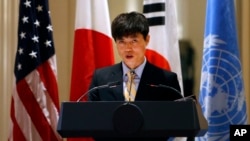The disclosure by a key United Nations witness, that parts of his testimony about his life in North Korean prison camps were untrue, is raising questions about the credibility of the U.N. report on human rights abuses in that country.
While the U.N. said the altered testimony was not critical to the inquiry, his shifting story illustrates the difficulty of verifying information in one of the world’s most secretive countries.
Shin Dong-hyuk’s testimony in front of the U.N. Commission of Inquiry into North Korea helped document a network of political prisons in North Korea and atrocities that include murder, enslavement and torture.
But his recent admission that parts of his story are not true has prompted Pyongyang to cast doubt on the Commission’s report.
North Korea’s state run news agency said, "The admission of his lies goes to prove that everything told by those who claim to be 'defectors from the North' cannot be trusted."
Credibility of report
The U.N. Commission chairman has said the inaccuracies in Shin’s testimony do not damage the credibility of the report that includes testimony from hundreds of witnesses.
Ahn Chan-il, a North Korean defector and president of the World Institute of North Korea Studies, also defended the U.N. report.
Ahn said in reality, human rights violations are still ongoing in North Korea that are 10 or 100 times worse than what Shin and other victims have testified to.
Shin maintains that the relevant details of his brutal torture in the camps are true, including being hung by a hook over fire and witnessing the execution of his mother and brother.
But Shin admits he was misleading about certain dates and locations. He also failed to mention that he had escaped twice to China, where he was caught and sent back to North Korea, and that he was tortured for escaping at the age of 20, not 13, as he had said in the past.
Human rights advocate Choi Yong-sang, with the Network for Democracy and Human Rights in North Korea, said it can be difficult to get defectors to give complete and truthful accounts of their experiences.
Defectors' accounts
Some may withhold details to protect family in the North. Some may repress painful, traumatic memories. And, Choi said, some exaggerate their stories to the media, especially if they are being paid for their interviews.
He said defectors who tell more sensational and interesting stories get more attention from the media, which can lead to financial gain.
Because North Korea greatly restricts visitor travel and communication in the country, outside groups must rely on defectors who escaped to verify allegations of abuse.
While Shin’s story has proven not to be entirely accurate, human rights groups said there is still a preponderance of evidence to support the U.N. commission’s finding to recommend that North Korea's human rights situation be referred to the International Criminal Court.
VOA News Producer Youmi Kim and VOA Korean Service Reporter Han Sang Mi contributed to this report.





